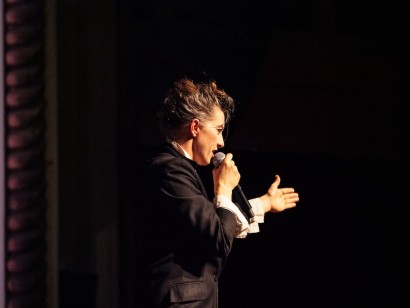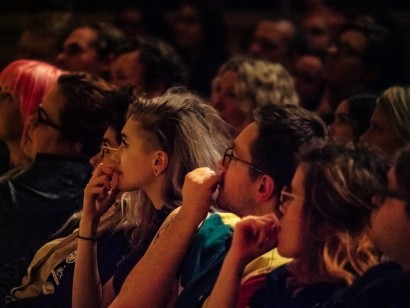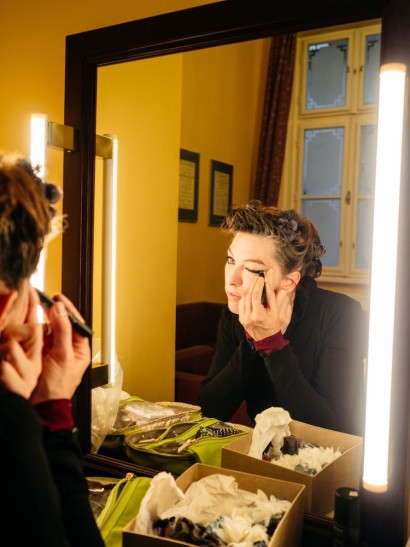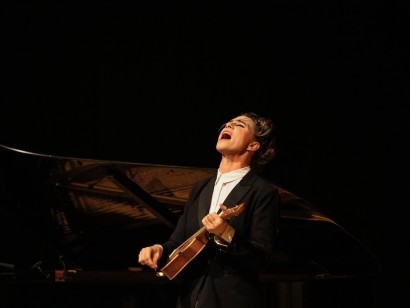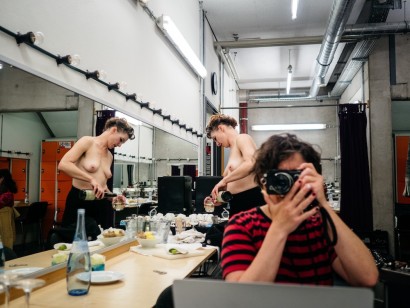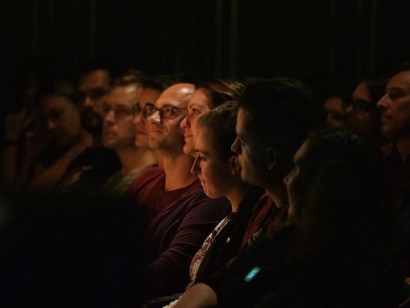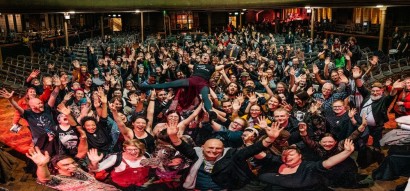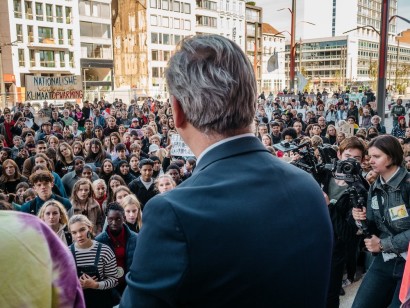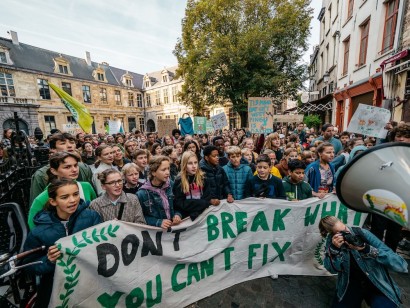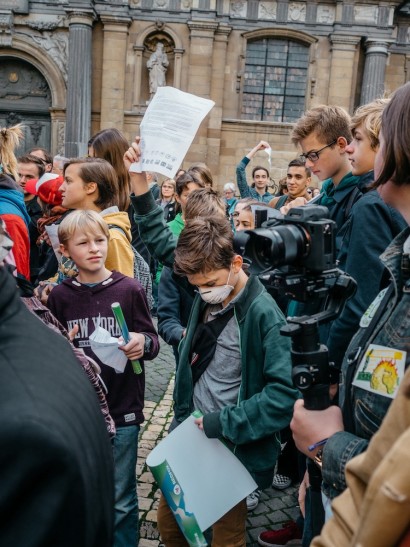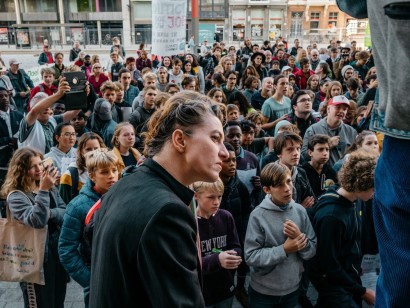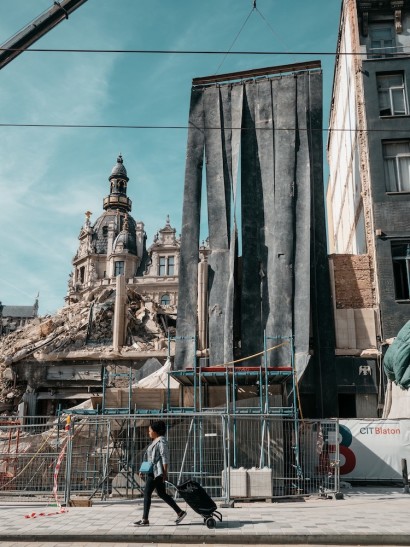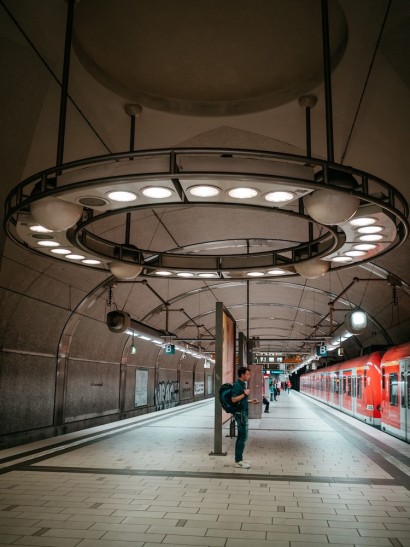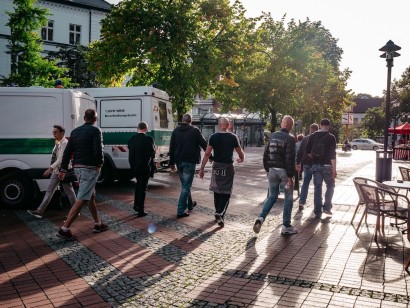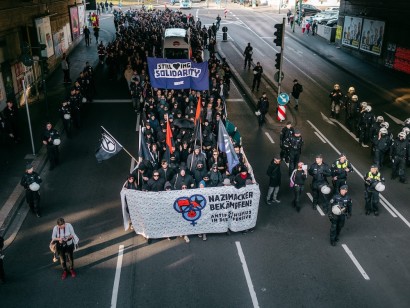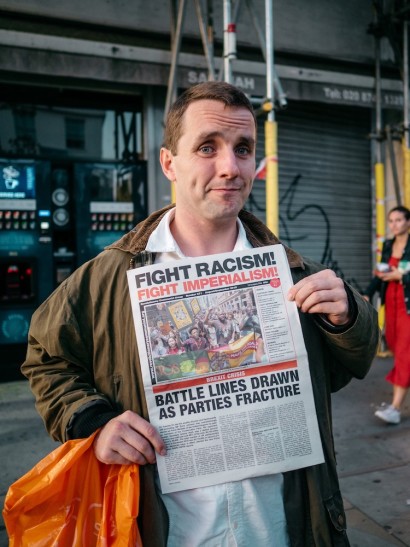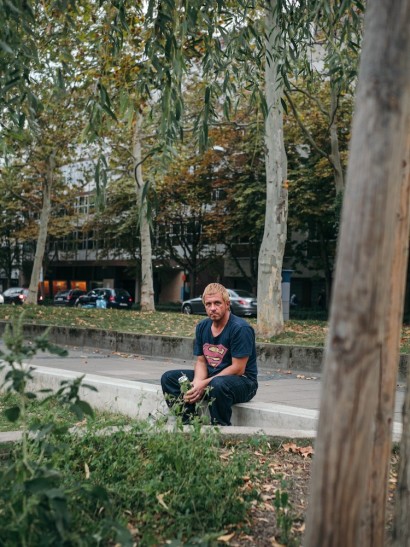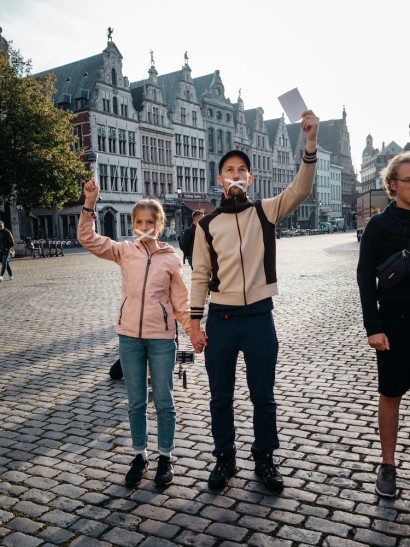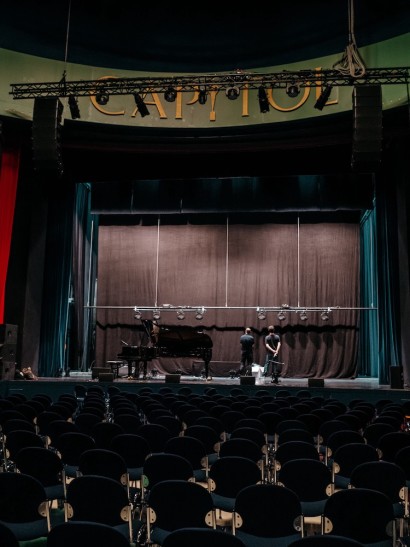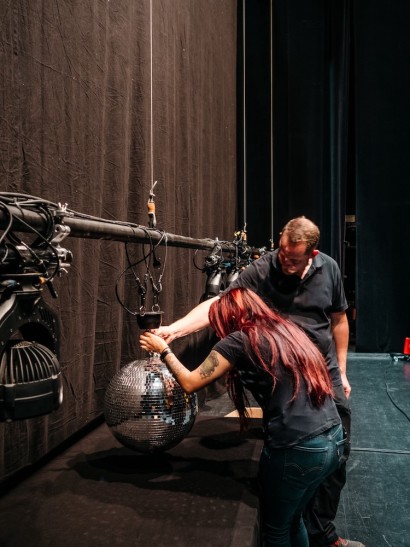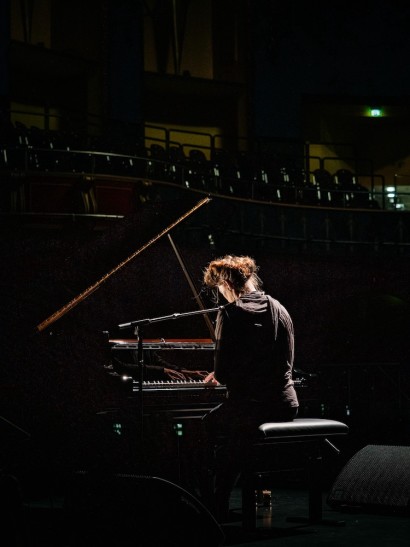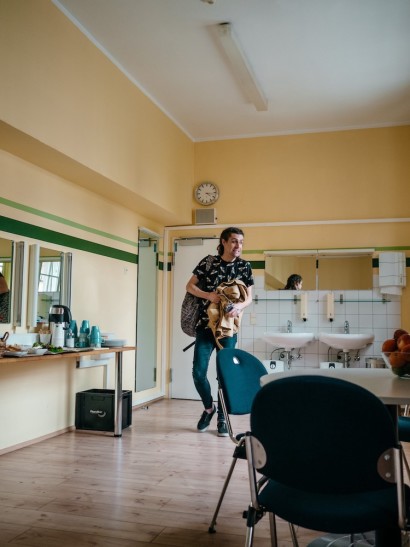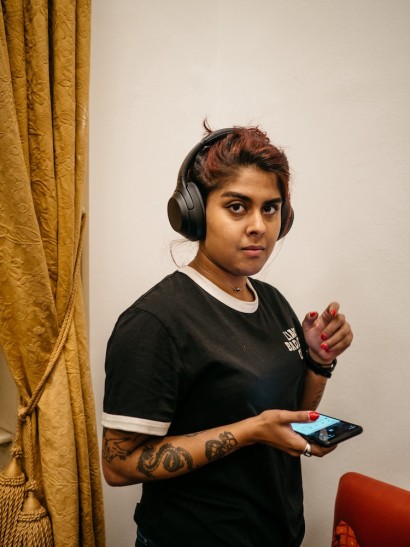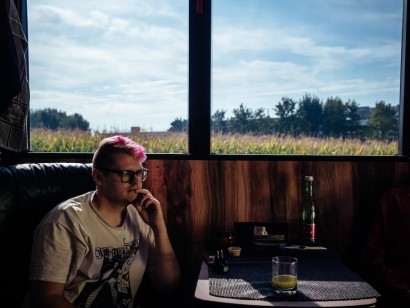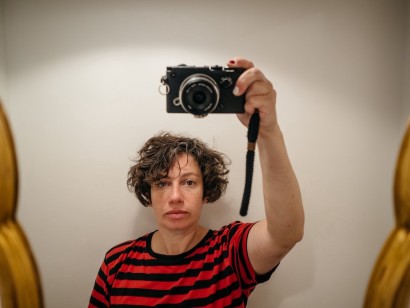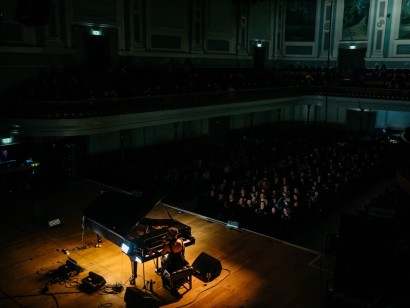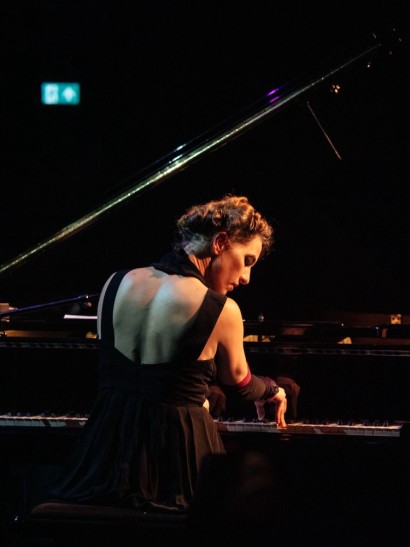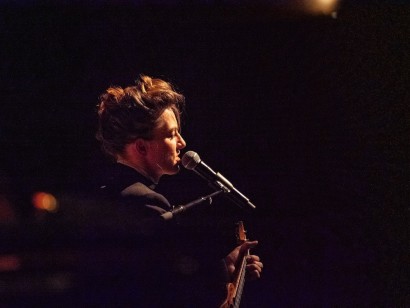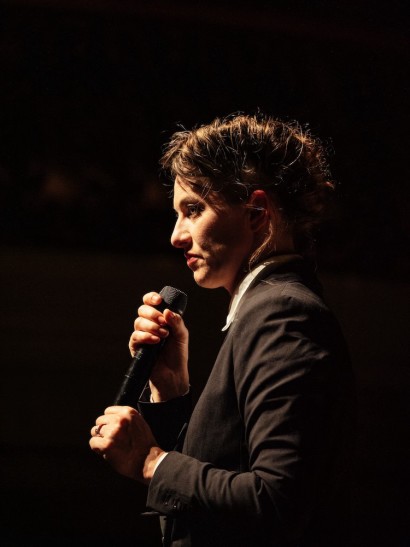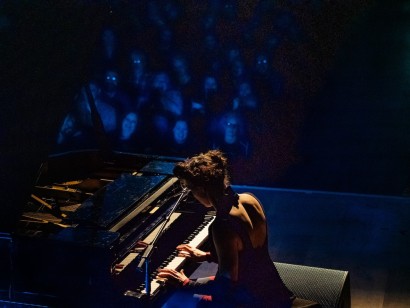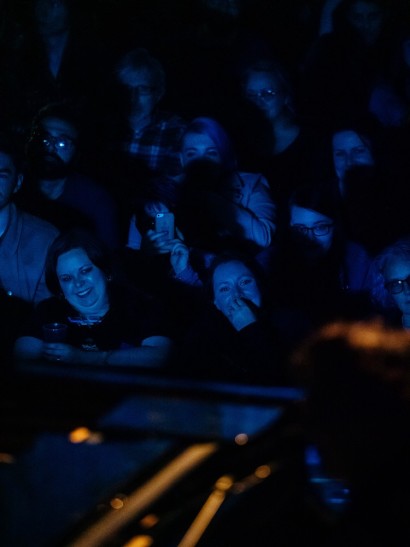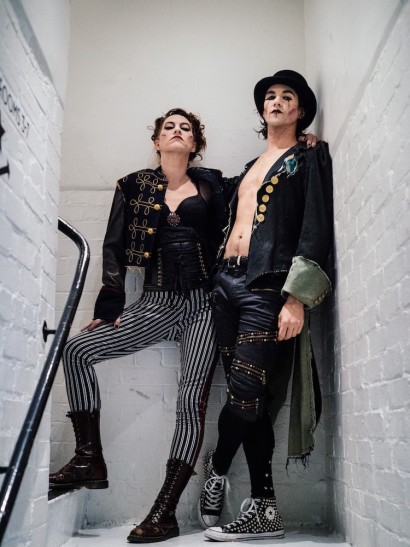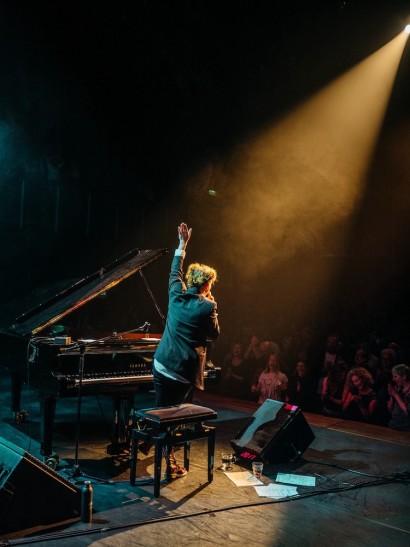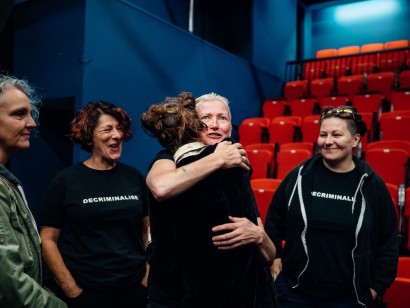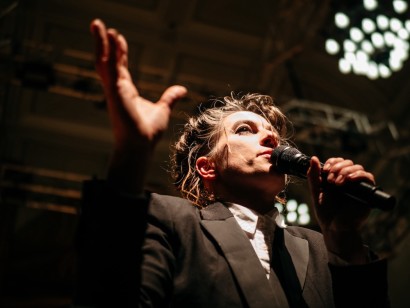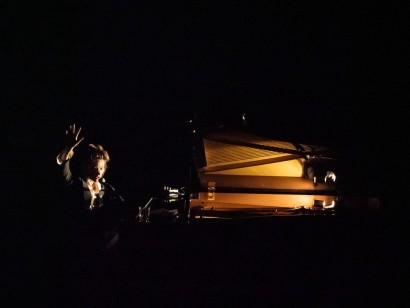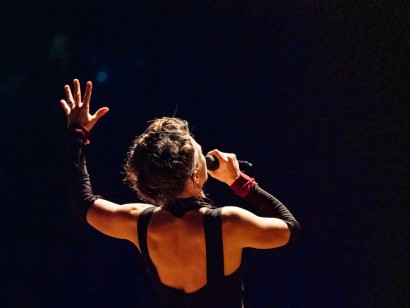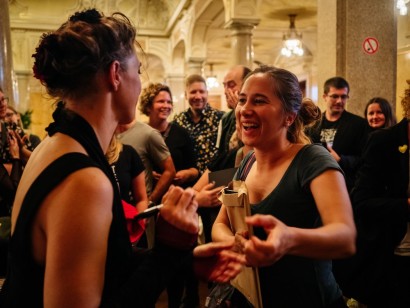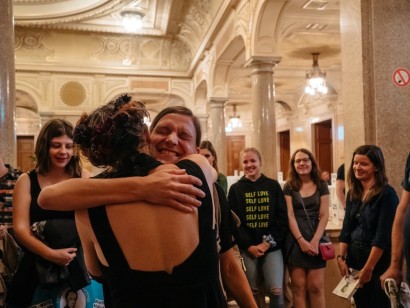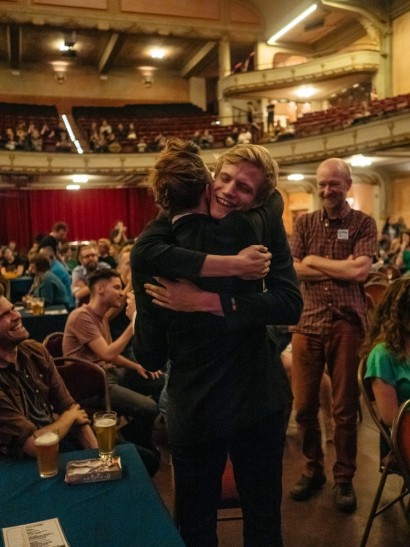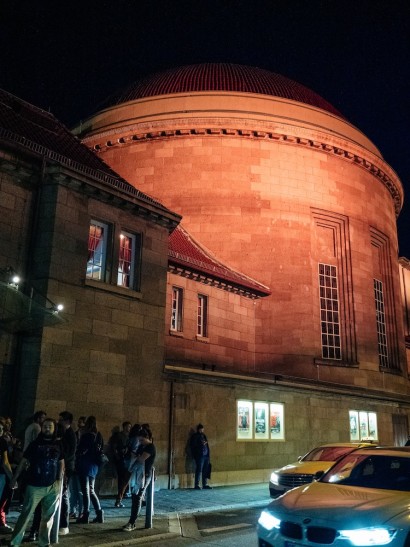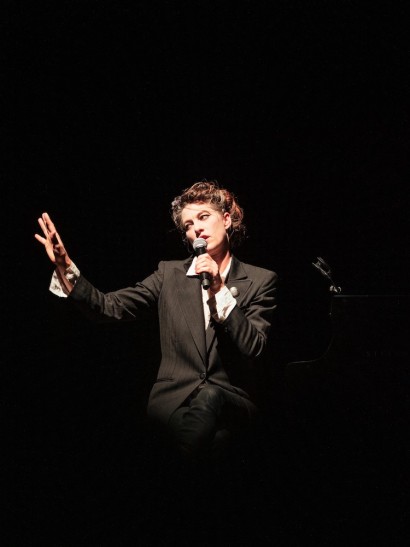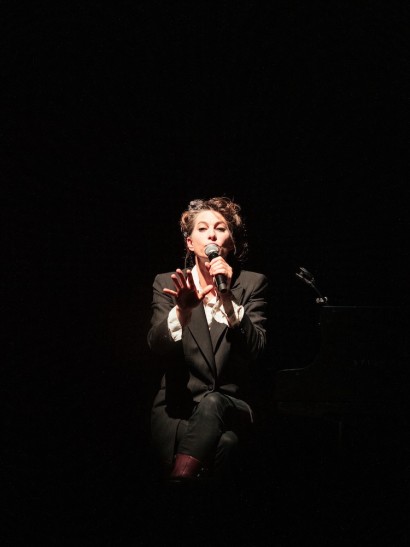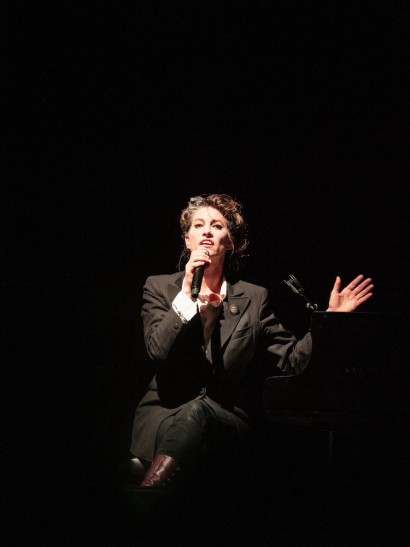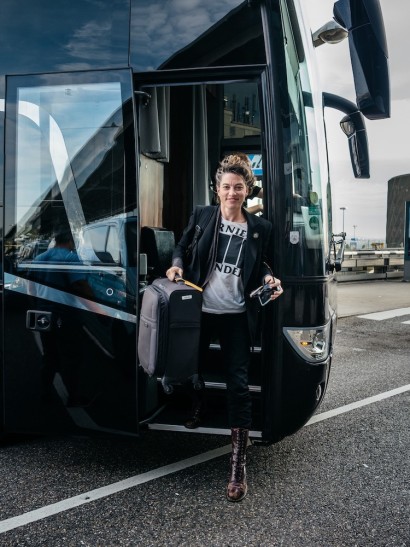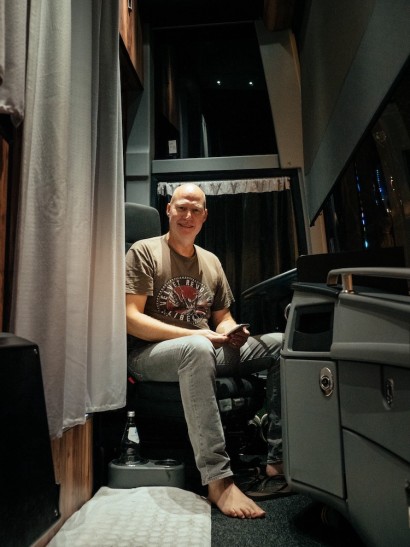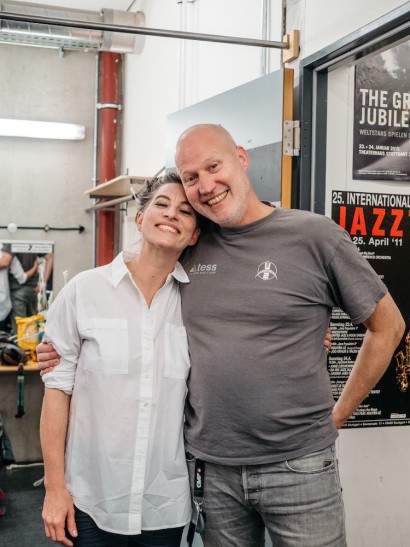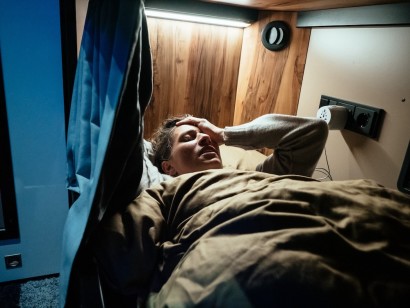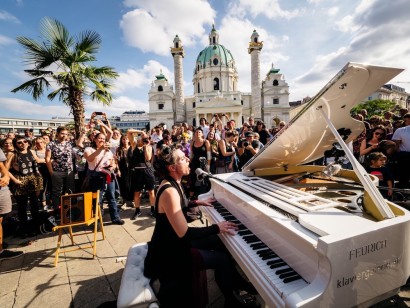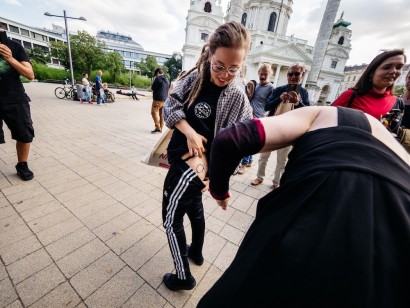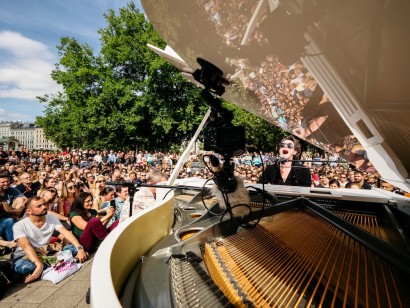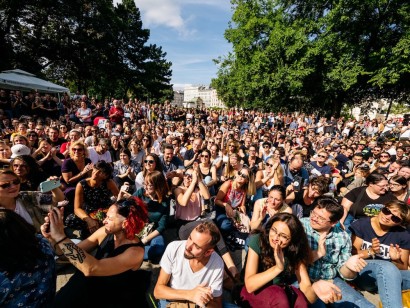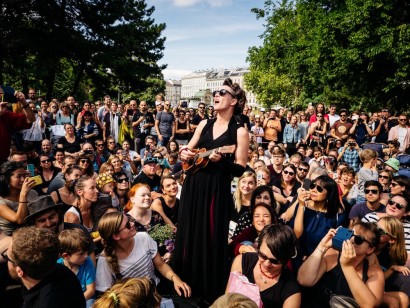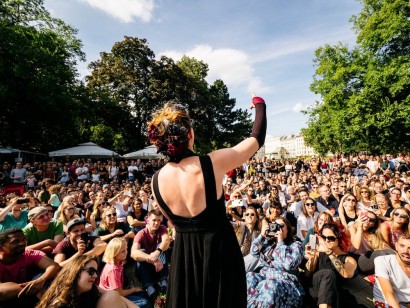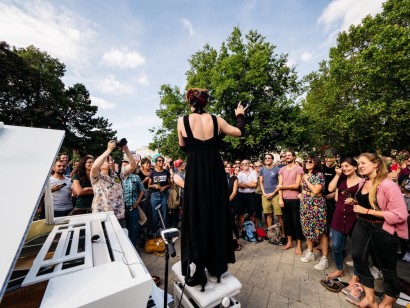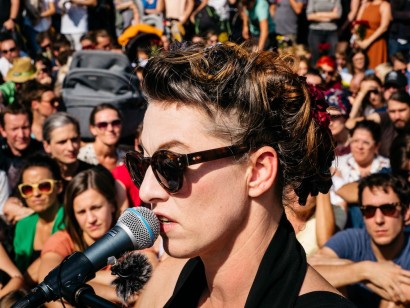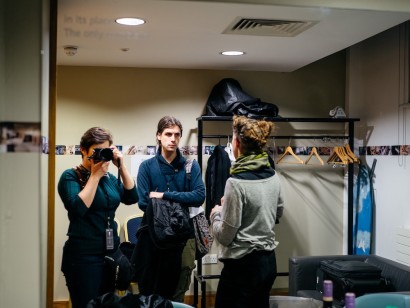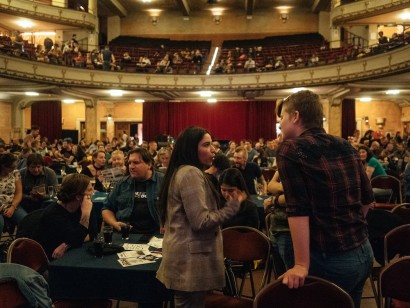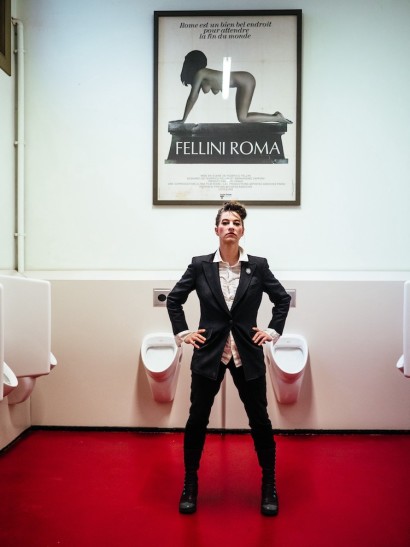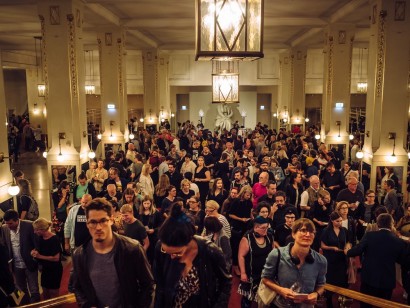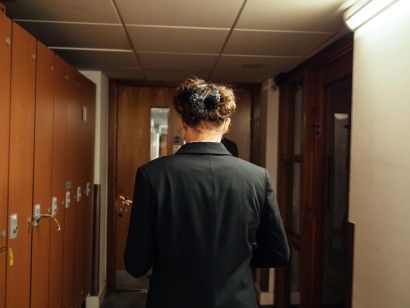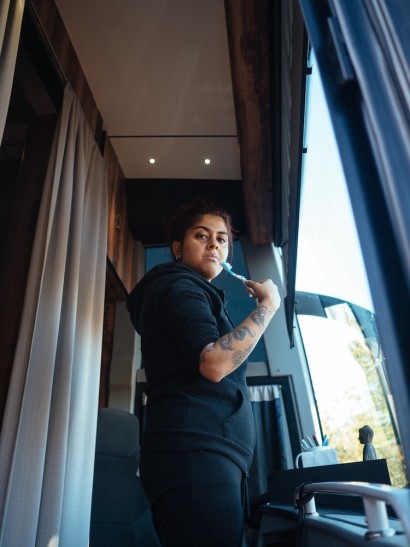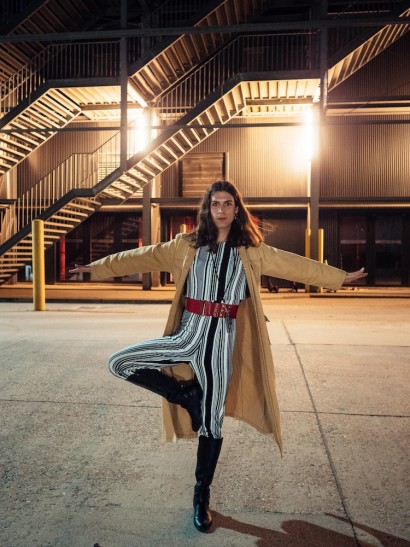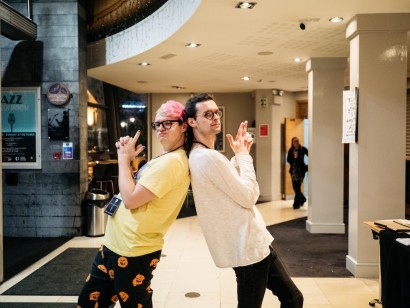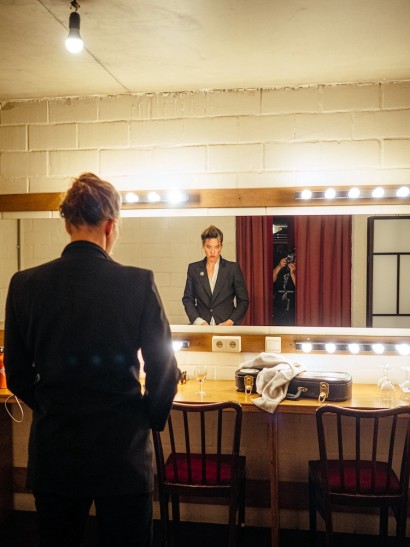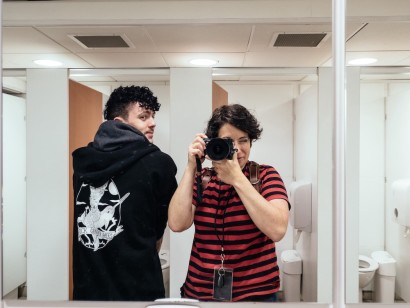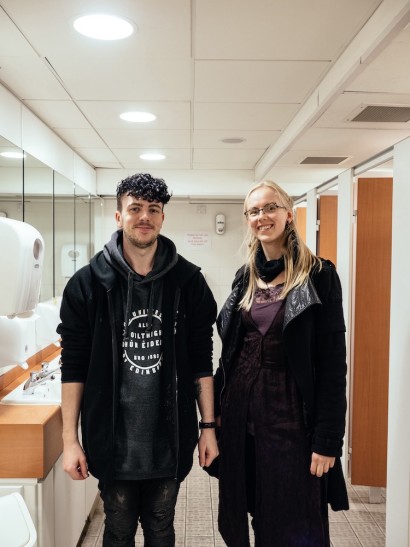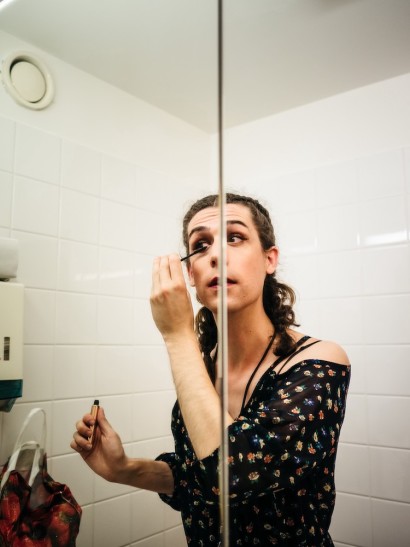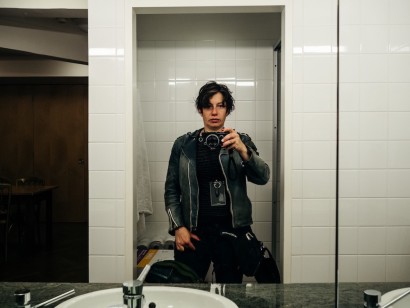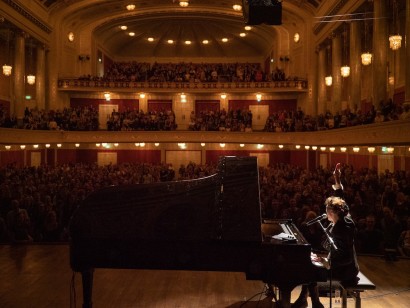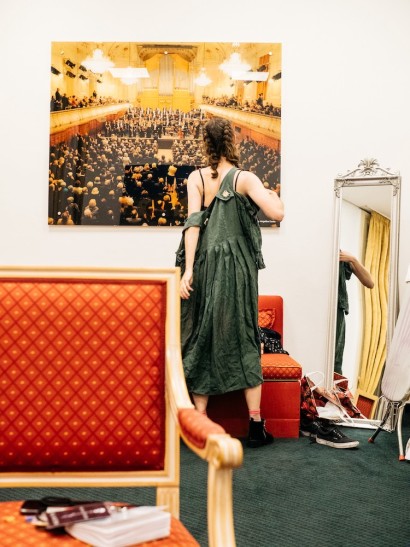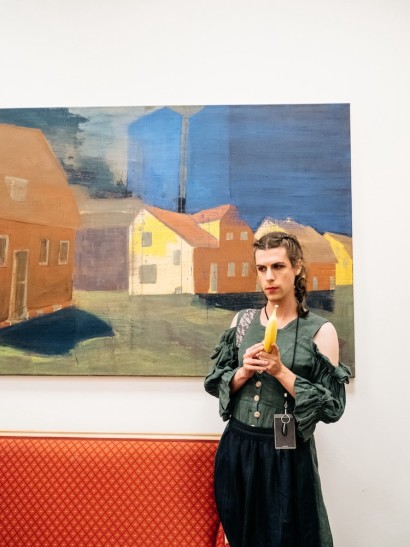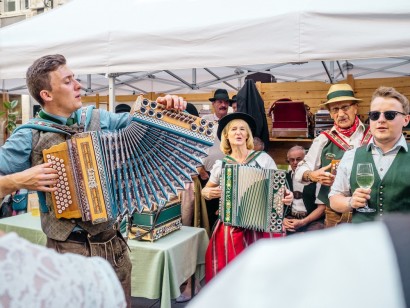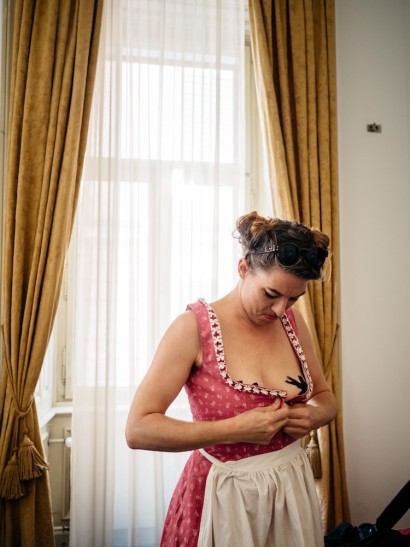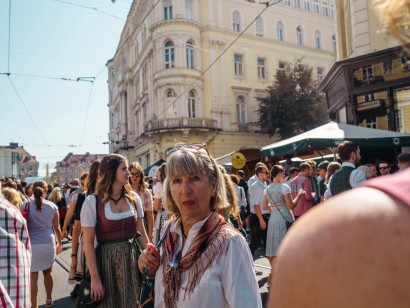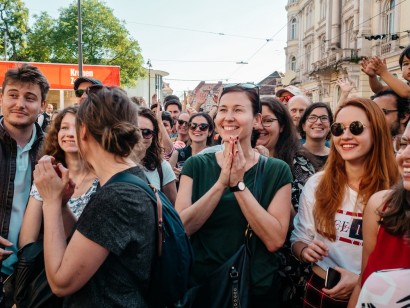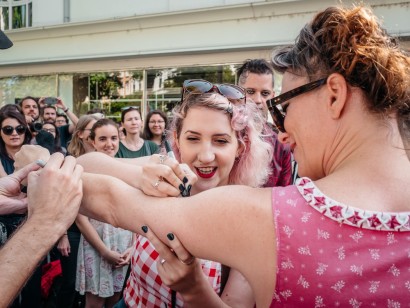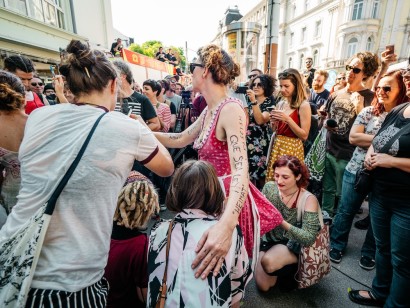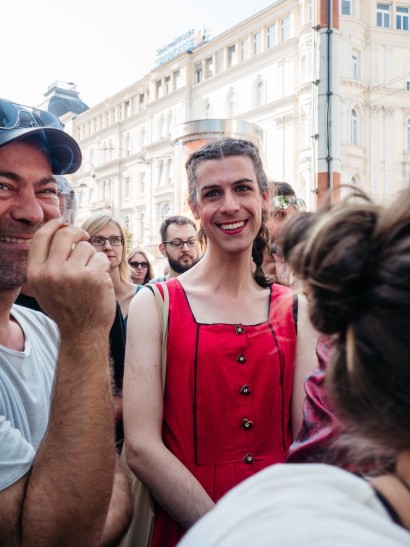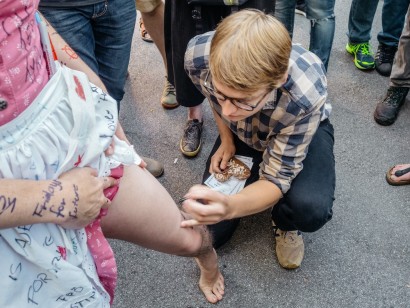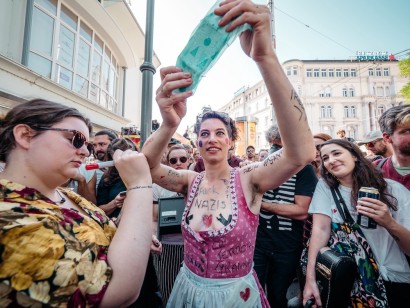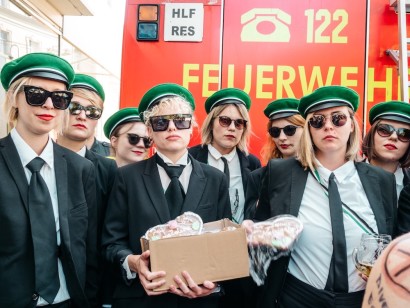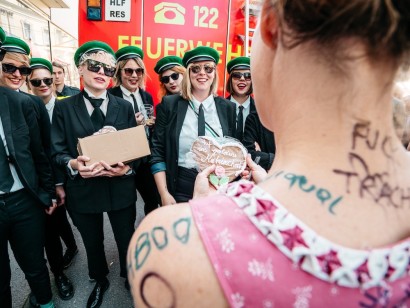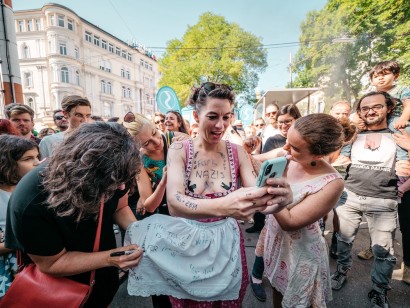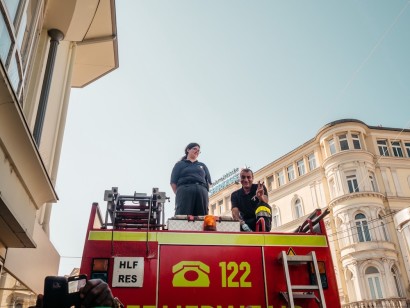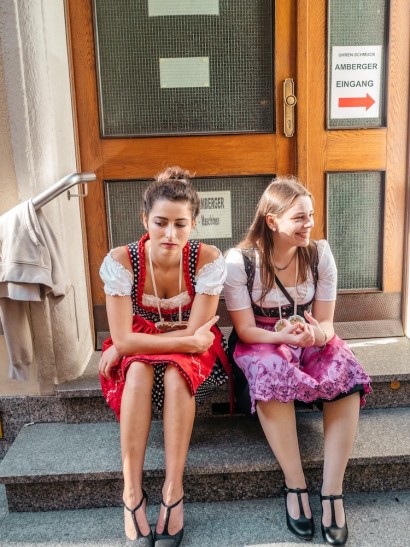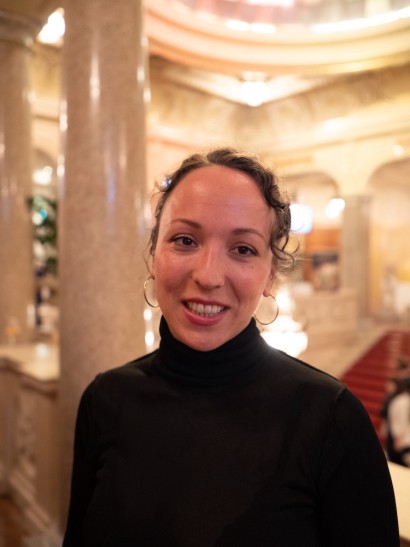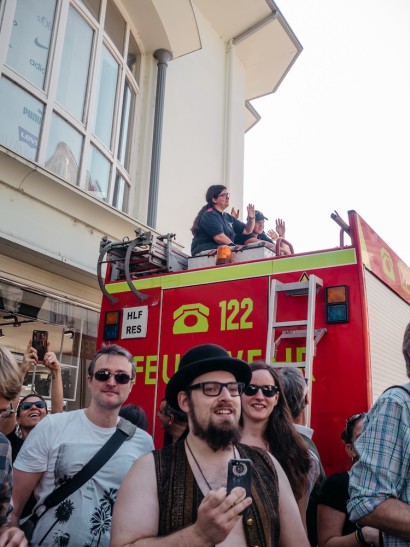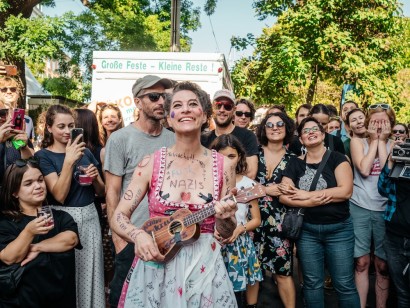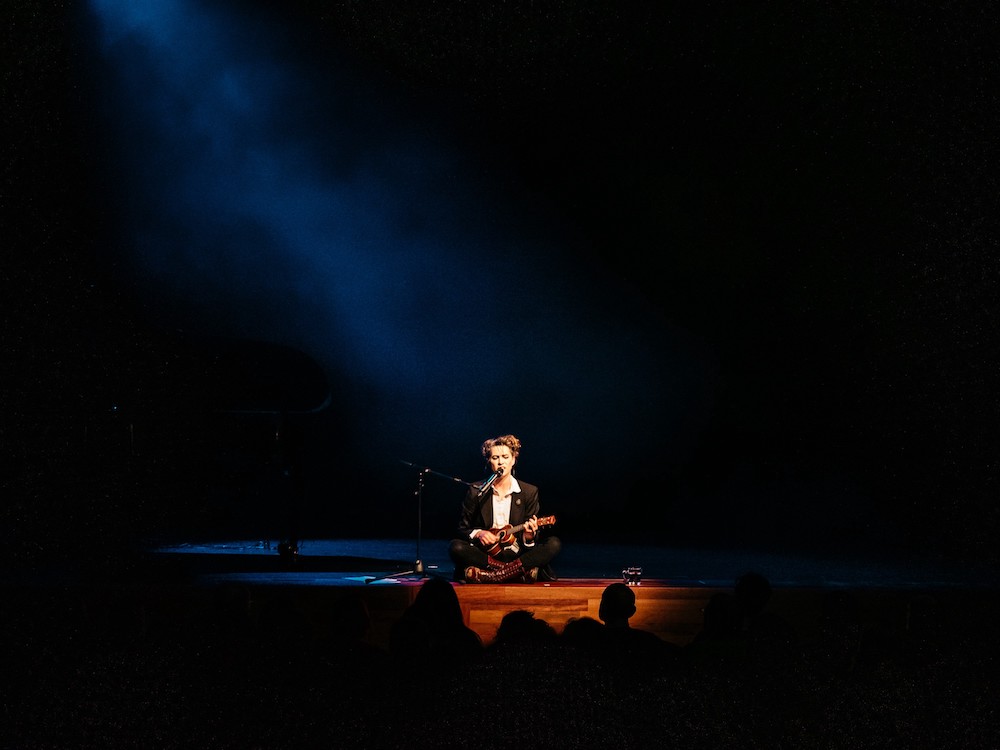
There Will Be Some Introspection — On The Road with Amanda Palmer
Part 1: Us and Them
Words: Jack Nicholls
Photographs: Gabrielle Motola
I sit before a stage, night after night. A blue-green spotlight shines against the darkness, and into it strides a woman in an exquisitely tailored jacket, red leather boots and a white shirt. Sometimes she carries a ukulele, sometimes a glass of wine. She looks out at a sea of faces and begins.
“Compassion is very complicated. When I was fourteen years old, a man tied me to a table in his basement.”
Backstage in Vienna
People who have heard about Amanda Palmer think they know Amanda Palmer. She’s the lead singer of the world’s loudest mime band, The Dresden Dolls. She’s the woman with drawn-on eyebrows who quit her record label to make crowdfunded art. She’s Neil Gaiman’s attention-seeking wife. She’s the artist whose lyrics can either save lives with their loving empathy or mock a community’s trauma, depending on how you interpret them.
In Austria, she is deeply associated with jam.
Reading other people’s opinions of Amanda Palmer reminds me of the parable of the blind men and the elephant. One person opens Amanda’s Twitter account and says, “Ah, Amanda Palmer is a narcissist.” Another reads her book The Art of Asking and says, “Ah, she is a philosopher.” A third and a fourth listen to her music; one says “Ah, she is a healer,” and the other, “Ah, she is a bigot.” And Amanda, the elephant at the center of it all, marches on and trumpets her opinions to the sky.
Amanda on stage in Antwerp
These conflicting ideas of Amanda Palmer can be intrinsically tied to the internet and the way information echoes and distorts down its infinite corridors. Most celebrities project a tight-beamed image of themselves, meaning that whatever fragment of their narrative reaches you, it will reflect the whole. Fractal publicity.
Amanda doesn’t do this. She applies a 20th century rock star’s laissez-faire attitude to public relations, beneath a 21st century lens of scrutiny. She changes her mind. She adopts theatrical personas in her songs. She pours out her thoughts at an overwhelming pace on Twitter, in letters, in song, in speeches, in performance art; there’s barely a medium she hasn’t tried in her quest to connect with people. One of the things many people know about her is that she takes her clothes off, a lot, and that is as good a metaphor as any for how she faces the world.
Backstage in Stuttgart
In that vein, her new record There Will Be No Intermission is a heavily autobiographical album which engages with deeply personal topics: abortion, miscarriage, grief, 20th century children’s writer Judy Blume. And then to make it more raw, Amanda built a stripped-down, confessional show around it, devoid of artifice and, for long stretches, devoid of music. Like a stand-up set, if stand-up lasted for three hours and made people cry.
Audience in Graz
She toured the show around the USA and it was very well-received by her fans, but made little impact in the wider media. That was when I got an email from her. We’ve known each other socially for ten years, she was familiar with my writing, and she wanted me to chronicle the European tour “like Almost Famous, but with fewer drugs and more abortion”, and instead of working for Rolling Stone I would be getting paid directly by her community on the website Patreon, who each pay a couple of dollars a month towards Amanda’s projects.
Amanda after the show with her patrons in Manchester
In other words, the Queen of Patreon wanted to become my patron. Via her patrons.
Embedded journalism. Unpleasant memories of Iraq went through my head. I admire Amanda’s music, but I’m not a fan. I took on the job because what I am interested in is the same thing that interests Amanda. What is the point of making art, or making anything, at a time when we are accelerating into crisis?
Youth for Climate march in Antwerp
A central street in Antwerp (left), Offenbach Train Station (right)
In late 2019, Western societies are at their most precarious moment since at least the Second World War. We are exhausted by a decade of economic stagnation and future-shocked by technologies that manipulate our thought-patterns. Mental illness rates are spiking; the institutions that have long structured our world are cracking; the Arctic and the Amazon are burning; our topsoil is washing into acidifying oceans that are emptying of fish. As Leonard Cohen said, “Everybody knows.” We all know a darkness is gathering, but instead of drawing us together, that fear has driven us into denial and infighting.
“Neighbourhood Walk” of ‘Steelerjungs’ in Steele (left), Essen; anti-fascist counter-protest in Steele, Essen (right)
In The Lord of the Rings, Frodo tells Gandalf that he wishes such terrible events had not happened in his lifetime.
“So do I,” said Gandalf, “and so do all who live to see such times. But that is not for them to decide. All we have to decide is what to do with the time that is given us.”
Street portrait in London (right), street portrait in Stuttgart (left)
If anyone embodies this deeply political, deeply chaotic moment, it is Amanda: her online world, her philosophy of radical empathy, her attempts to connect and her confusion about how to do so. So with the time given me, I decided to write the story of what it is like to be on an Amanda Palmer tour in 2019. I saw it as the story of what it feels like to be a human seeking connection at what can feel like the end of the world.
Youth for Climate silent protest, Antwerp
……….
Capitol Theatre, Offenbach
OFFENBACH: I Found My People
Subul and local crew in Offenbach
My arrival in Germany was very This is Spinal Tap. Having found my way backstage at the Capitol Theatre in Offenbach, I was hauling a very heavy suitcase up and down concrete stairs, stumbling through security areas, abandoned kitchens, and darkened halls full of stacked chairs and trunks. I saw a mirror ball raised in the rafters, but security-conscious Germans were clearly unhappy with that situation, and had placed a “safety table” beneath it, so nobody would walk under it as it fell.
“Und ein Schiff mit acht Segeln…”
I spied Amanda through curtains, alone on a dark stage. She was singing of a ship with eight sails, a tune from The Threepenny Opera in the original German. “Seeräuber-Jenny” tells the tale of Pirate Jenny and the Black Freighter that sails in and slaughters everyone who once wronged her. I could see how it might appeal to Amanda.
Amanda sound-checking in Offenbach
I followed a thread of light from the stage and found the dressing room, where Amanda’s core crew members sat before enormous plates of meat laid out by our German hosts. Subul Lodi, the precocious lighting designer from Manchester; Alex Knight, also British, who had risen through the ranks of Amanda’s fan community to handle the merchandise; Chez Stock from America, handling sound and managing the organisation; and Gabrielle Motola (Gaby), the intensely skilled, intensely thoughtful American-born and Britain-based photographer, who would be my artistic partner for the tour and is responsible for the pictures throughout these pieces.
Jack Nicholls arriving backstage in Offenbach (left), Subul Lodi backstage in Graz
Alex Knight on the bus (left), Gabrielle Motola in a bathroom in Stuttgart (right)
And then it was time to watch There Will Be No Intermission.
The show lasts for three hours, and the only reason Amanda doesn’t push it longer is that the concert venues in Europe have curfews. She covers most of the songs on her new record, but they are weaved into a confessional, darkly comic piece that tries to “bring light to the darkness” by talking about things not often talked about: Amanda’s three abortions, one miscarriage, and the death of her best friend. Four losses and a funeral.
It’s funnier than it sounds.
Amanda performing in Belfast (left), Closeup of the audience in Belfast (right)
Amanda told the story of her adolescence, how she was inspired by the dark music of The Cure and Nick Cave, which she loved as a way to escape the darkness in her own head. Then in her 20s, she founded The Dresden Dolls with Brian Viglione. “We were the gay mime band,” she told her audience. “We were radically inclusive. And through them, I found my tribe. I found my people.”
Dresden Dolls reunion London October 2018 (left, middle), There Will Be No Intermission in Amsterdam (right)
Her people applauded. This was not a typical gig with a mixture of fans and interested locals just looking for a night out. Many of the people here had been loyally following her for twenty years. The songs are intensely specific scraps of Amanda’s autobiography put to music, drawing on real names, places, moments. But in her retellings, the small details of her own life become avatars of shared human experience.
“Machete,” written in the immediate aftermath of the death of Amanda’s best friend, spoke to anyone who had lost someone. “A Mother’s Confession,” chronicling loops of tearful exhaustion, resonated with everyone who has struggled to keep a tiny human alive. And throughout, Amanda grapples with fears over her own reproductive choices, resonating with everyone who has faced the question of abortion and not known who to turn to.
Embracing abortion rights campaigners after the Irish Times Women’s Podcast in Belfast
By the time I arrived, Amanda had already run this show over forty times in America — stripping bare her pain, grief and secrets — but repetition had not wearied the material for her. The crew told me that the show was ever-evolving, and that the harrowing tale of the table in the basement had only been introduced for the first time recently. The show had a hushed, almost religious air, at times Amanda whispering into the microphone. It’s a far cry from the type of shows that made her name, where howling her lyrics, she once cracked her tooth against a microphone. Here, the audience hung on her every word.
“Amanda, I’m sad!” shouted an audience member. “But it’s cathartic!” cried another voice in the dark. And this was undoubtedly true. In the show, Amanda was unrepentant about making light of topics such as abortion and murder. “I am an artist, If I have a job, it is literally to go into the darkness… and make light.”
Or, as Gabrielle put it, she is a shaman, channelling a community’s fears and purging them through song. The tears I saw in that theatre were not tears of grief, but release.
Amanda mentions Hannah Gadsby’s show Nanette as an inspiration, but I know from my own attendance at that show, people stumbled out of Nanette shell-shocked. People cried together every night at There Will Be No Intermission, but by and large, they walked out smiling.
Amanda signing after the show in Graz
Was the ritualistic air intentional, I asked Amanda after the show, and she said it certainly was. “I’m trying to channel, in a secular way, the best part of what a church used to provide: a place people can go to be with a community and feel human.” And then, exhausted but exhilarated, she returned to the lobby to embrace her fans and exchange whispered words with them until the venue’s security coughed meaningfully and gestured to the door.
Fans in Graz (left), Fans in De Roma Theatre, Antwerp (right)
There were many reasons why Offenbach’s beautiful, neoclassical Capitol Theater had felt like a sacred space that evening, but the foremost was…it was one. Before it hosted musicians, the elegant building had been a synagogue. It was burned in 1938, as part of the Kristalnacht vandalism, then bought up in a literal fire sale by the city.
Amanda was very aware of these ghosts. In the 1990s, in love with both German culture and a German man, she earned a BA in German Studies from Wesleyan University in Connecticut. As part of her degree, she spent six months on exchange at Regensburg University, pulling pints in a Bavarian beer garden while she drank up the language, history and culture of the region; and she’d spent six months performing avant-garde theatre in Cologne, an experience that clearly influenced the aesthetics of The Dresden Dolls. Coming-of-age for Amanda was tied up in discovering Germany, and now as she watched the patterns of the world, it was impossible for her not to think about the stories she knew so well.
“You know your history,” she told her audience. “You know that women’s reproductive rights and fascism have a strong relationship. I wouldn’t be doing this tour in this way if the extreme right were not in ascendance all over Europe and the world.” The echoes of these old hatreds in new guises would be a theme Amanda would return to again and again, both in Germany and beyond.
Amanda performs in Vienna
After the show we were introduced to our home for the next two weeks: a sleek, black, tour bus most definitely bigger on the inside, with its bunks, lounge, coffee machine, kitchenette and mirrored ceilings that had probably witnessed more than they cared to. Tinted windows ensured privacy and mood lighting within its walls. It was a Black Freighter of our very own, sporting a tattooed crew of many nations and firing its cannons at the patriarchy; and with her big boots and commanding voice, Amanda was every inch the pirate captain.
Amanda dropped at the airport in Stuttgart to fly to London for Ash’s 4th birthday
Our bus driver was a jovial, bald German called Dirk. Amanda looked at him with growing recognition. Dirk! He had driven her and Brian around Europe way back in 2005. “Yes,” he said in a deep voice, with a big smile. He’d seen her name “on the board,” had requested to have her again. Fifteen years later, he still had fond memories of Amanda Palmer.
Dirk on the bus in Vienna (left), Amanda and Dirk backstage in Stuttgart
“The music is little sadder these days; are you ready to cry?” she asked him.
“Sure, I have a lot of tears left.”
“Good. I’ll beat them out of you with a bloody fist,” said Amanda with a grin, then retreated to her bunk.
The Black Freighter was on the move.
…………..
Karlsplatz, Vienna
VIENNA: Open Piano For Refugees
Eighteen hours later, Amanda sat at a piano in a crowd of a thousand people, framed against a backdrop of golden towers of Vienna’s Karlsplatz. A woman pushed forward, fumbling with her belt. “Amanda! Please don’t freak out, but a few years ago you signed something and, well, I got it tattooed.” She pulled her tracksuit bottoms down and showed her bum, where Amanda’s scrawled signature was inked across the cheek.
Everything is connected, and every beginning has its own beginning. To explain why Amanda Palmer was looking at a bum in Vienna, you might go back to the late 2000s, when drought in Syria exacerbated volatile food prices, raising tensions that by 2011 exploded into civil war. Millions of people were forced from their homes, many fleeing north to Europe. By 2015, when the so-called refugee crisis was in full-swing, over a million asylum seekers were registered as arriving in Germany, while thousands more were stranded in Hungary and Austria. In a rare confluence of moral and economic motivation, Chancellor Angela Merkel intervened to tell border officials to process asylum applications from Syrian refugees, even if Germany had not been their first port of call in Europe. Given the geography of Europe, of course, it could not have been. In effect, she opened the door to hundreds of thousands of refugees, who were predominantly working-age men.
If the Germans thought the rest of Europe would follow their lead, they were disappointed. Other countries turned away, and the cultural shock of the new arrivals helped drive the German far-right party Alternative für Deutschland to 12% of the vote in the 2017 election. Similar anxieties were weaponised in Britain’s 2016 Brexit referendum, which included campaign imagery of dark-skinned refugees crossing into Europe, with “BREAKING POINT” written above them.
To counter these narratives and help new arrivals integrate, the Open Piano for Refugees movement was founded by Udo Felizeter and Nico Schwendinger in 2016. They place upright pianos in public spaces across Germany and Austria, encouraging members of the public to play, talk, and get to know each other across cultural boundaries. The money they raised in donations went to funding a music school in Vienna, where students from migrant, refugee or local backgrounds came together both to learn and to teach music. Amanda had arranged to play some free outdoor concerts to raise funds and awareness for the project.
Vienna is a city of gold and white, on such a scale that it feels like it was built by a departed race of giants. I got lost in its boulevards, and by the time I arrived at the sunny plaza, a thousand people had already gathered. The strumming of a ukulele told me I was in the right place. I caught glimpses of Amanda between the bodies, Gaby loyally following, snapping shot after shot, but I lingered at the edge soaking up the atmosphere. Babies cried, strangers chatted, grown men stood solemnly on cafe chairs to see.
Amanda’s voice carried clearly above the murmur of the crowd. She sang about worshipping the sun and aching for change. She sang “Map of Tasmania” and “Creep”. “Shall we just skip the show, get some beers, keep playing?” she shouted.
She raised the mood expertly, and then when she judged the people around her most receptive, she hit them with politics. She talked about her and Neil visiting refugee camps, and reminded the audience of the photo of Alan Kurdi, the toddler drowned on a beach, and this launched her into her song she had only played once before in public: “In Harm’s Way.”
Amanda says she has no protest songs, but this is nothing if not a protest against inhumanity and cruelty. It just doesn’t have a very strong bass line.
What I cannot see can not be not unseen
Standing on the barrier of you and me
Standing where the ocean meets the land
We cross even though we understand
We cross even though we see the child in the sand
I looked around at the spellbound audience, at the searing blue sky, at the baroque golden church looming and glittering. Even as Amanda was diving into the dark it was so, so bright.
White.
Gold.
Wind.
Water.
In a distant apartment block, an arm waved a red shirt from a window and it was like a call to revolution.
Amanda played long past her deadline, until her lateness went from fashionable to emergency and she had to be hustled away. Without her presence, the crowd fragmented. I snatched a moment with the organiser Udo, barefooted and draped in earth-toned clothes.
“We are not political,” he assured me. “The project is just about bringing people together.”
I disagreed. Bringing people together is the essence of politics. Making art about the world is political. Amanda may be a singer, but it was clear to me that at the same time she was deeply engaging with the politics of the moment.
I asked Amanda that night about the origin of “In Harm’s Way.” In 2017 she was feeling useless, doodling at a piano while millions of people fled for their lives. As so often when she was uncertain, she turned to her Patreon community and asked them where she could go that might be helpful. It turned out she had fans currently volunteering in the Greek island of Lesvos, so Lesvos was where Amanda went.
Gaby photographing Jack and Amanda backstage in Belfast
Lesvos (or Lesbos) is the Greek island famous as the home of the poet Sappho, but it is also notable for its location. Positioned only a few kilometres offshore from the Turkish coast, in 2015 alone it became the entry to Europe for almost 400,000 migrants, four times the settled population. By the time Amanda arrived, the systems for resettlement had broken down, and thousands were living in stasis while the nations of Europe argued over whose responsibility they were.
“I went to this refugee camp and played a free concert, and I met a young woman named Diba. She was living in the camp, and her situation was incredibly fucked up, but she had an amazing family, and I just remember meeting her and thinking, ‘You. You’re amazing.’ She told me she was going to be the President of Afghanistan one day. It was one of those moments you just connect with someone.
Diba attending the Antwerp concert
“That week in Greece changed me,” Amanda continued. “I’ve thought about it ever since. Children forced from their beds. Uprooted. We have to humanise them. If you can’t see these children as your own, you’re not seeing.”
These conversations about migration were the background hum among the tour crew. An endless undercurrent of, “Did you hear about this shit?” “Did you hear they are revoking citizenship for Hispanic citizens in the United States?” “Did you hear they are locking up millions of Uyghurs in China?”
The natural human response to these nightmares is to become accustomed to them. Four years ago, the world was briefly stopped in its tracks by the photograph of Alan Kurdi, but now detention camps of refugees on Europe’s margins have become normalised, as they have been in my home country Australia for twenty years. As climate change and drought erode the liveable boundaries of our planet, these trends will only get more oppressive. Amanda brooded on what the point of her art was, in a world where children died in the surf. But I saw that on that day, at least, she forced people to confront the situation again. People criticise artists for not offering solutions to injustice, but at least music can remind people that there are questions.
Amanda in the men’s room at De Roma in Antwerp
Breaking Bathrooms
The Vienna Concert House, with its chilly, twisting corridors above golden ballrooms, reminded me uncomfortably of the Overlook Hotel in The Shining. Wandering its halls, I mused on how much access to space is a function of privilege.
Audience in the lobby of the Weiner Konzerthaus, Vienna
Concert halls are huge operations, with an endlessly changing cast. We wore all-access passes, but as an experiment, I put mine in my pocket and continued to stroll past idling security guards. Nobody bothered me, assuming I belonged. We are taught who is “us” and who is ”them” from birth in a thousand subconscious ways.
Amanda is also someone who goes where she pleases. It is not true to say that she strides through places like she owns them, because she is not proprietorial. She just strides through spaces like she has every right to be there, which sounds unexceptional until you think of how many people do not. Especially women.
Amanda headed to the stage in Glasgow
At the venues and behind-the-scenes, this was an extremely woman-centric tour. I am not experienced with international rock tours, but everyone stressed to me how unusual this was. Aside from Dirk the driver and “Merch Queen” Alex, everyone aboard the bus was a woman. All of them would have stories for me over the next two weeks; of unwanted touches, of uncomfortable situations, of disrespect. As one of our crew said, “These men join the lifestyle thinking it’s going to be Motley Crue in 1987, and it’s not, and they take it out on everyone because they don’t have the partying they think they were promised.”
Subul on the bus in Limerick
This crew was a conscious choice by Amanda, who wanted to foster a more “female and empathic environment” for a show very centred on women’s experiences. If there was ever a song that passed the Bechdel Test, it was “Voicemail for Jill.” A woman, speaking to another woman about abortion, in a song written to be played by people going through one of their most vulnerable moments. Amanda told me that her audience had always leaned female in the Dresden Dolls days, and since going solo it had become more so. I was self-conscious about where I fit into this group.
In Vienna, Amanda had mentioned that “Voicemail For Jill” was her favourite song on her new record. Breezily, I said I preferred “The Ride,” Amanda’s bittersweet paean to life that closes her show.
“That’s because you haven’t had an abortion,” Amanda said.
She didn’t mean it unkindly, but I recoiled terribly. And this might be a time to back up and explain that I had spent the tour so far presenting as female.
Jack in the bus parking lot in Antwerp
Growing up trans in Australia at the turn of the millennium felt a little like having the plague five years before the discovery of penicillin. Given there was virtually no social media community for trans people online, I feel sure that my life would have turned out very differently if I was born ten years later. Instead, I was asked “are you revolted by your body?” by septuagenarian psychologists, and when I admitted that I wasn’t revolted as such, they pursed their lips and shook their heads. For better or worse, I was discouraged from transitioning in 2002. In the last few years as — somewhat bewilderingly to me — my private pain became the most talked about social issue of the decade, I retreated from the whole debate and ended up claiming some sort of non-binary space for myself.
In a world of climate change and economic inequality, gender is not the fight I want to have, and I am happy for people to use whatever pronouns for me they want. But suddenly I had been dropped into a tour about abortion and motherhood, and it stressed me out to be taking a role that perhaps should be done by a someone with a woman’s experiences. I was suffering from imposter syndrome and my old friend, gender dysphoria.
Alex and Cal in Cork
But one thing that had always helped me on the gender front was Amanda herself. “Half Jack,” for obvious reasons, has been a favorite of mine for a long time. As someone who has known Amanda Palmer for a long time, I can confidently state that she is not transphobic. On the contrary, in the taxonomy of humanity it is clear that she welcomes trans people as a part of her team of beautiful outcasts.
And yet transphobia is one of the most frequent of the many attacks made on Amanda, usually stemming from the Dresden Dolls’ 2006 song “Sex Changes,” which contains confronting lines such as:
You get your choice of an aesthetic
Ah we need to chop your clock off tick tock, tick tock, tick tock, tick tock
It might not be what you expected
There is no money back once you’ve been ripped off, ripped off, ripped off
Like most Dresden Dolls songs, it is self-consciously macabre and theatrical, and it appears ambivalent at best about sexual reassignment surgery. Perhaps understandably, as Amanda was in a relationship with someone due for such a procedure at the time, and surgery can be confronting both for loved ones and some trans people ourselves. But it infuriates Amanda to have her poetry reduced to a simplistic “message.”
“That song is a quadruple entendre. It’s reductive to say that it’s just about sexual reassignment, it’s also applicable to childbirth, abortion and loss of virginity. To reduce it to sexual transition pisses me off; it’s always pissed me off. The song is a Rorschach test, and it’s like that for a reason. Don’t tell me what I meant.”
Of course, an artist cannot control how their art is perceived. In There Will Be No Intermission, Amanda is very consciously using her personal life to make a political statement. In “Sex Changes,” she was exploring aspects of her personal life. When you are sometimes making political statements and sometimes riffing on your emotions, is it a bit much to expect your audience to keep track of which is which?
Amanda in her dressing room at De Roma, Antwerp
All the more in a world where anti-trans rhetoric has become a cheap form of virtue-signalling (vice-signalling?) among reactionaries, such as Australia’s empty-vessel Prime Minister Scott Morrison recently burbling that he was going to “sort out” gender-neutral bathrooms in Parliament because they were “political correctness over the top.” It’s again dividing the world into an Us and a Them — the oldest and deepest split in humanity. For some people (mostly women, mostly over 40), a refusal to allow trans women into the tribe of cis women is a significant part of their political philosophy.
Trans-exclusionary feminism is interesting to me because it is one of the few political issues which cleaves across the Left, whereas usually everyone in “the tribe” falls into line on the same side of an issue. If I am told someone supports Bernie Sanders — or even just likes a show like Broad City — I can infer an awful lot of correlations in aesthetic and political tastes. But I cannot be sure about their opinions on who has the right to piss where.
Still, there was no split among the crew. From Amanda on down, everyone was strictly in the pro-trans camp. “Trans women are women,” said Subul emphatically. They were Us, and Amanda had been clear that she wanted gender-neutral bathrooms at every event.
“Fuck Gender Roles” A male-identifying fan and Gaby in the gender-neutral toilets in Glasgow
Of course, her order had immediately run into bureaucratic complications. The venues in Luxembourg and Austria told her it was a legal requirement for them to offer sex-segregated facilities. Other venues prevaricated. My favourite response was from Paris, suggesting that perhaps we could compromise by just having our lone dressing-room toilet “gender-neutral .”
It made Amanda angry, both on behalf of her fans and philosophically. Amanda has always been someone who enjoys blurring the lines between public and private space, whether it is stripping naked in a bookstore or broadcasting her dinner conversations on Twitter. And bathrooms were surprisingly important to her. They came up when we were brainstorming what angles this feature might take.
“Bathrooms,” Amanda said.
“Bathrooms?”
“That’s right. Tampons, sex, vomiting, drunkenness, drugs, confession. You could interview people.”
Yikes. I imagined the pushback I might receive, lurking in the toilets with a tape-recorder, whatever my outfit.
When I was eight years old, the girls’ toilet at my primary school had throbbed like a splinter in my mind. Since then, I’d spent a lot of time in bathrooms labelled for both men and women, and enjoyed the contrasts and continuities between them. They are fraught spaces for trans people, especially non-passing and non-binary ones. But I’d also had moments of connection with women in bathrooms: compliments given at the mirrors that have remained lodged in my memory like diamonds, and signs of acceptance from the group I had wanted so long to join.
Amanda’s romantic experiences of the sanctity of the bathroom perhaps came from Boston nightclubs. In Austrian opera houses, there wasn’t a whole lot of bonding happening in bathrooms, though they were certainly capacious.
Fans in the gender-neutral toilets in Glasgow
Before the Vienna concert, I stood alone in one designed for an entire orchestra, obsessively doing my makeup. Partly because it was fun, but also I knew — as a tribal marker of my own. Look at me! I am one of you.
Jack backstage in Vienna
Gaby was wandering the halls, buckled in harnesses, trying and failing to find her way back to the ballroom. Spotting me, she took out her camera and started photographing me. You have not felt self-consciousness until you are doing your mascara with a 50mm lens aimed to your face.
“The kind of bonding Amanda is talking about happens when you are young and drunk,” Gaby said. “People grow more cautious when they’re older. You know, the Icelanders have a word for the kind of connections that happen in women’s bathrooms: trúnó. Bathrooms are places of safety.”
“They don’t always feel safe for me,” I said.
“Which bathroom do you normally use?”
“When I’m dressed like this, women’s. Because I’m afraid of going into the men’s.”
She nodded like this was natural, but the truth is that though I have been warned to fear the violent policing of gender binaries, in the progressive cities I make my home I have never suffered more than a double-take in the men’s toilets. My fear of assault didn’t come from any experience, but from a cultural unease. Exactly as with most of the fear directed towards trans women.
“Are you seeing the side-eye you get from the crowds?” Gaby asked.
“Not really. I’ve trained myself not to meet people’s gaze. What is it like?”
“Shock, initially. Followed by jealousy, curiosity and disgust, all mixed together.”
“It’s hard living on the edge of passing. I was raised to think that ‘Always Be Passing’ was the motto of trans life, but it’s an impossible goal for a lot of people.”
“Like staying young. You can’t control it.”
“Exactly. And trans people obsess over the parts of our body we can control, to make up for the parts we can’t.”
We stared at our reflections in the mirror, equally rueful.
Gaby backstage in Vienna
In 2006, when “Sex Changes” was released, surgery was seen as the final marker by which a transgender person moved from one community to the other. But this has changed in 2019, I think for the better. We are starting to accept that people can belong to one group or another without scrutinising their genitalia. A majority of trans people today do not undergo surgery, and many reject the gender binary entirely. But everyone wants to belong somewhere. And I knew that was exactly what I was attempting by spending so much care on my clothes and makeup.
Amanda performing at the Weiner Konzerthaus, Vienna
That night was a great show, in a grand venue. Amanda’s shadow on the wall looked insectoid, her big-haired silhouette twitching and jerking like a shadow puppet from the 18th-century world the golden hall evoked. Afterwards, I lingered outside to talk to departing fans, with gender on my mind. Given that the show is so focused on the experience of being a woman in the world, I was interested in how men responded to it. One man, Simon, told me that he had been overwhelmed. “I couldn’t say that I understand what a girl feels, but listening to the show, I could imagine a little of what it must be like. It made a connection.”
I moved to a pair of trans women, asked them how they had taken the show. One said that Amanda’s inclusive language with regard to non-binary people had improved dramatically since the Evelyn Evelyn tour.
“So you feel more welcomed now?”
“I am a trans-binary woman. It’s nothing to do with me,” she said coldly. “Now if you’ll excuse me, I have to go smoke a joint by the water.”
Inclusive language is important. I didn’t transition medically, but it is not because my soul suddenly changed. It is because I was welcomed into the tribe of womenfolk anyway. I have strong female friendships. When I shop for clothes, I am no longer sent to dressing rooms across the street as I once was. And of all the places I have been, it was among Amanda’s fan community I felt the most relaxed. With my costume and behaviour, I was saying to them, “I want to be in your group.” And in response, from Amanda on down, everyone was saying back to me, “Welcome. Use whatever damn bathroom you want.”
Jack backstage in Graz
Aufsteirern Festival in Graz
GRAZ: Dancing in Dirndls
The best part about life on a tour bus is the waking up, opening the curtains, and discovering where you have appeared during the night. In the city of Graz, we had arrived unwittingly into the Aufsteirern, a culture festival for the Styrian people of southern Austria.
Even at breakfast, the streets were filling with locals and foreigners in their best leather shorts (lederhosen) and flouncy dresses with low cut blouses (dirndls), the kind of dress that English-speakers associate with Octoberfest. Musicians on bandstands played trombones, and a farmer carefully drove his tractor onto a lawn where its rural purity could be admired and photographed by the city folk. They were two weeks out from an election here, and posters of candidates’ smooth smiles filled the streets. It was clear from the prevalence of Freedom and People’s Party posters that the Right-Wing were ascendant here. The Styrians don’t like the Syrians, sang a voice in the back of my mind.
Amanda had not intentionally booked a music performance to coincide with accordions and lederhosen, but having done so, she was in her element. She rushed to her computer to summon her patrons:
okay. we obviously need to make a serious plan here, because… we do.
first of all, i obviously have to do some kind of ninja gig in the middle of all this shit.
YOU! GRAZ!! you know this place better than i do.
you gotta find me a good spot that is big enough that we can all gather and hear each other (like, it can’t be in the ACTUAL MIDDLE of another crowd) but it needs to be ridiculous enough that we can take pictures of people wearing lederhosen and dirndls. and i don’t want to get arrested. is that clear? no arresting. i’m a mom now.
SO WHERE SHOULD WE DO THIS?? we will probably need to gather around 2pm or 3pm.
I AM WIDE OPEN.
graz, help me.
does anybody have 50 spare lederhosen and dirndles? OR MAYBE WE CAN HAVE A SHARPIE-OUR-BODIES BEER PARTY! i’ll look into the nudity laws. YOU THINK I AM KIDDING OH NO I AM NOT.
hit me in the comments please. we need to do…SOMETHING.
i mean really.
The response was… lukewarm. Wanda Tiefenbacher, for example: “Drunk people will be everywhere. Bear in mind this event is quite politically loaded as well. It’s election time. There is a chance that ‘too much disruption’ is met with hostility.”
This is not the way to deter Amanda. She does not believe in Too Much Disruption.
Amanda had put out a request for traditional dress (tracht) the day before, and been rewarded with a bag of dresses flung onto the Vienna stage from a fan named Raphaela. Now she drew them out with a flourish, insisting that Gaby and I join her in her mission. She had a hot spotted pink number that looked far from traditional to me, and a bulky green dress that Gaby took, rather unwillingly. Amanda wriggled into her pink cocoon of femininity and cackled as she adjusted it, adding black tape across her nipples that threatened to spill forth. “Fucking Hell, this is just a boob frame. The armpit hair is glorious.”
Amanda getting ready for Ninja gig in Graz
And so we pushed out into the world.
Streets of Graz
Amanda has a tangibly magnetic personality. When she is among “her people,” they inch closer and closer when she stands still, and when she moves, the crowd moves with her. Here, the polarities were reversed. She cut through a seemingly impregnable wall of flesh at a brisk pace, people shifting minutely to clear the way.
Fans in Graz
When we arrived at the appointed space beneath a golden pillar there initially seemed to be nobody. But as Amanda waved her arms, her people emerged. Maybe a hundred of them, dressed universally drab, they pushed towards us and formed an awkward island amidst the stream of tracht.
“Very few of you are wearing tracht,” Amanda observed. “For a reason, I understand.”
Nervous laughter. She sized them up, made a quick decision, and pointed to her pink outfit.
“We’re going to deface this dress!” Cheers! “Who wants to deface this dirndl?” Awkward silence!
There must have been two hundred people around us now, a crowd within the crowd, and within moments Amanda had dragged them into a cluster around a group of surprised firemen and women and their big red truck. She asked for marker-pens, proffered them to the people around her. “Just write your feelings about the tracht, on the tracht,” she coaxed. The crowd shuffled in and Amanda spread her arms, Christ-like. It was all very punk.
Gaby was perhaps wisely refusing to change into her dirndl, citing her strapped arsenal of cameras and harness, but I was growing jealous of the costumes around me. “Did anyone bring another dirndl?” I asked, and moments later a stranger thrust a deep-red dress into my arms. This was the dizzying world of Amanda’s community, where your wishes came true like the rub of a genie’s lamp. The crowd loyally covered the external sightlines so I could make a quick change. With my festive braids, I had a real Styrian look going on, and my cheeks flushed happily to match my outfit.
Someone handed Amanda a baby, it burst into tears and she hurriedly returned it. A woman offered a sanitary pad. “My legs are not off limits,” Amanda said, shaking her limbs at the crowd who then knelt at her feet, markers scritching. The firefighters descended to extend a line of protective tape, warding off our little party.
And then the Buschenschaft Tyrannia came.
Their presence was electrical. A dozen young white women in black suits, shades and ties, topped with jaunty green berets and with a green sash across their chests. Their sashes and bearing flashed an old memory through my mind, of General Jinjur and her army of women in The Marvelous Land of Oz.
For a moment people recoiled, perhaps thinking them some paramilitary group, but Amanda rushed to embrace them.
“Tell me about you!” she shouted.
“Uh… matriarchy!” they shouted back.
“Matriarchy? Great! Come to the show.”
“We’d love to!”
“Everyone come to the show!” Amanda yelled. “I’m putting everyone here on the guest list.” She was carried away by the festive mood. By now she had “FUCK NAZIS” across her boobs, but the “fuck” was in a lighter hand and colour so from a distance her cleavage just bewilderingly proclaimed NAZIS. UNITY was written over her white skirt, with a little love heart atop her vagina.
“Does it look good?” she asked, craning to look at herself.
“Good apart from the swastika,” said one Austrian, deadpan, and Amanda went into a tail-chasing spin.
“What?! That is the one thing that IS off-limits!” she said, then was reassured by the laughter.
“The swastika symbol is illegal here, isn’t it?” I asked the deadpan man.
“Yes. I mean… officially… ”
While Amanda tried and failed to lure the female firefighter down to revolt against patriarchy, I let the current of the crowd wash me to the periphery and fell into conversation with a woman my age called Mercedes Springer. She was wearing gym clothes rather than tracht, so I asked if she liked the festival.
Street photo in Graz
“That’s a hard question. Folk costumes have come back into vogue, but now people hide behind heimat [homeland] and ‘traditional culture’ to express reactionary views. Why should they get to claim it? My grandmother dressed like these people, and I’m a mushroom farmer. It’s my dress too. But if I wear it, I feel defensive.”
Amanda had the ukulele out now, and was going through her greatest hits from a street light. Mercedes teared up and told me a very moving story about a friend who had died, and how Amanda’s integrity and honesty about death had helped her get through it. She said what I would hear so often on this trip — that the songs, especially the bleaker ones, were cathartic. Amanda’s grief had helped Mercedes lift her own.
Mercedes Springer in Graz
“I’m getting married now, to a beautiful woman,” Mercedes said, showing me her engagement ring. “All I want is to start a business, have a baby. But given what is happening in the world, we can’t look away anymore. We have to take part.”
Amanda was climaxing with her ukulele cover of Radiohead’s “Creep”, and getting the whole crowd to dance. She had even broken through the firefighter’s reserve. I saw them grinning aboard their truck, waving their arms in time with the crowd.
Amanda grabbed a passing young man in a rakish black hat and the finest leather shorts and asked if he wanted to join the crowd for a group photo.
He looked contemptuous. “You think this is a joke?” he said. “That our traditions are bullshit? Is this what you mean?”
“No no, I love Austria, truly,” she said earnestly. “I love you all, I love my dirndl.”
He gazed at her searchingly, then shrugged. “Ok,” he said, and posed for the photo.


